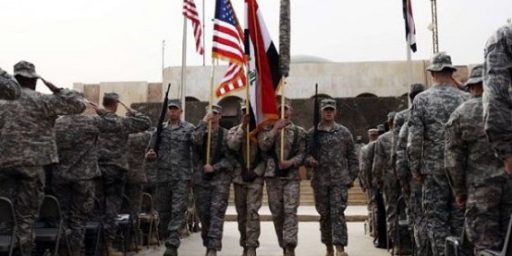FROM BAGHDAD TO BIN LADEN
Paul Wolfowitz (an object of near-universal scorn at the recent APSA meeting) makes the case that there is indeed a connection between Saddam and Bin Laden (an idea ridiculed repeatedly at aforementioned meeting) in today’s WSJ.
Despite their differences, the criminal remnants of Saddam’s sadistic regime share a common goal with foreign terrorists–to bring about the failure of Iraqi reconstruction and take the country back to the sort of tyrannical prison from which it has just been freed. The recent broadcast of a taped message by an alleged al Qaeda spokesman offered congratulations to “our brothers in Iraq for their valiant struggle against the occupation, which we support and urge them to continue.”
Anyone who thinks that the battle in Iraq is a distraction from the war on terror should tell it to the Marines of the 1st Marine Division who comprised the eastern flank of the force that fought its way to Baghdad last April. When I met recently with their commander, Maj. General Jim Mattis in Hillah, he said that the two groups who fought most aggressively during the major combat operations were the Fedayeen Saddam–homegrown thugs with a cult-like attachment to Saddam–and foreign fighters, principally from other Arab countries. The exit card found in the passport of one of these foreigners even stated that the purpose of his “visit” to Iraq was to “volunteer for jihad.”
<...>
Foreign terrorists who go to Iraq to kill Americans understand this: If killing Americans leads to our defeat and the restoration of the old regime, they would score an enormous strategic victory for terrorism–and for the forces of oppression and intolerance, rage and despair, hatred and revenge. Iraqis understand this. Alongside us, they are working hard to fight the forces of anger and hopelessness and to seize this historic opportunity to move their country forward.
Just as in the Cold War, holding the line in Berlin and Korea was not just about those places alone. It was about the resolve of the free world. Once that resolve was made clear to the Soviets, communism eventually collapsed. The same thing will happen to terrorism–and to all those who have attempted to hijack Islam and threaten America and the rest of the free world, which now includes Iraq. They will see our resolve and the resolve of the free world. Then they, too, will take their place on the ash heap of history.
<...>
Not long ago, a woman named Christy Ferer traveled to Iraq along with the USO. She’d lost her husband Neil Levin at the World Trade Center on Sept. 11, and she wanted to say thank you to the troops in Baghdad. She wrote a wonderful piece about her trip, and in it, she wondered why our soldiers would want to see her, when they could see the Dallas Cowboy cheerleaders, movie stars and a model. When the soldiers heard that a trio of Sept. 11 family members were there, she found out why.
Young men and women from across America rushed to the trio, eager to touch them and talk to them. One soldier, a mother of two, told Christy she’d enlisted because of Sept. 11. Another soldier displayed the metal bracelet he wore, engraved with the name of a victim of 9/11. Others came forward with memorabilia from the World Trade Center they carried with them into Baghdad. And when it was Christy’s turn to present Gen. Tommy Franks with a piece of steel recovered from the Trade Towers, she saw this great soldier’s eyes well up with tears. Then, she watched as they streamed down his face on center stage before 4,000 troops.
To those who think the battle in Iraq is a distraction from the global war against terrorism . . . tell that to our troops.
While I think Wolfowitz’ larger point is correct, the direct invocation of 9/11 and bin Laden weakens his argument. The connection is, at best, remote–and far less tangible than, say, that with the Saudi regime. Continual emphasis on the weaker points of the argument for toppling Saddam because they would have stronger emotional appeal if true is not a sound strategy.
(Hat tip: Kathy Kinsley)




You’re missing an “F” in the post title.
As much as I disagree with Wolfowitz, he is kind of the bookish equivalent of Rumsfeld— you can pretty much expect straight, unfiltered talk from him (until the end, where his invocation of 9/11 produced a similar nausea in me).
And he’s right: we have given Islamic radicals a chance to cooperate with hard-line secular Ba’athists towards a common goal. I’m also pretty sure you can’t retrofit that post hoc development onto the long line of discredited justifications for war, however.
I’d expect better from Wolfowitz. He’s basically saying that both al-Qaeda and Saddam hated America, hardly a proposition that anyone disagrees with. Is that the best he can do?
No, he is saying that the occupation of Iraq has united al-qaeda and the ba’athists by giving them a common enemy. Way to go, Wolfowitz.
This is just another, more elaborate way of stating Bush’s “Bring it on!”
Nevertheless, what evidence is there that there was this strong Iraqi connection to terrorists prior to the invasion that established Iraq as the central locale, the key domino, in the whole war against terrorism? That question, as far as I’ve seen, the war hawks have never answered and don’t even try to answer. All they ever do, when asked, is resort to some appeal to emotions. OTOH the evidence regarding the Saudi regime is reportedly not so scant at all and yet it’s blacked out in the congressional investigation of intelligence report.
—